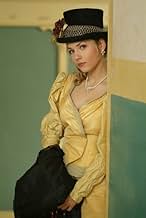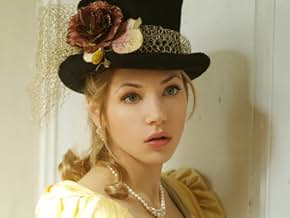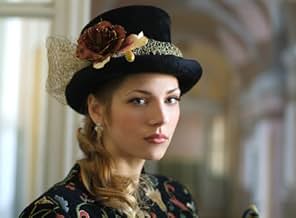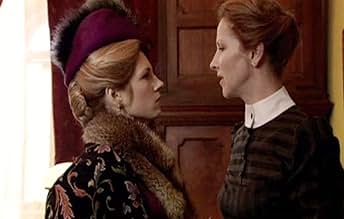AVALIAÇÃO DA IMDb
6,4/10
5,1 mil
SUA AVALIAÇÃO
O médico vienense Josef Breuer se reúne com o filósofo Friedrich Nietzsche para ajudá-lo a lidar com seu desespero.O médico vienense Josef Breuer se reúne com o filósofo Friedrich Nietzsche para ajudá-lo a lidar com seu desespero.O médico vienense Josef Breuer se reúne com o filósofo Friedrich Nietzsche para ajudá-lo a lidar com seu desespero.
- Direção
- Roteiristas
- Artistas
Michal Yannai
- Bertha
- (as Michal Yanai)
Ayana Haviv
- Singer - 'Hymnus an den leben'
- (não creditado)
- Direção
- Roteiristas
- Elenco e equipe completos
- Produção, bilheteria e muito mais no IMDbPro
Avaliações em destaque
Occasionally ridiculous in the dream/hypnotherapy sequences and borderline slapstick bio-pic in others, 'When Nietzsche Wept' somehow remained compelling enough to have me sit right through to the end despite an unconvincing father of psychoanalysis still having to show ID for the age of consent (Jamie Elman as Freud) and Katheryn Winnick as cigar chomping proto ladette femme fatale Lou Salome.
There is very little exploration of Nietzche's philosophical ideas here but instead his incredibly prescient innovation in the realm of psychology as seen through the prism of the incipient discipline of psychoanalysis in Vienna circa 1882. Ben Cross is brilliant as the likeable albeit conveniently repressed and commensurately flawed Dr Breuer, adrift in a loveless marriage, a materially successful career but bereft of passion, danger or excitement in his unfailingly dutiful life. Things start to resemble the relationship between poets Verlaine and Rimbaud at this point (see Agnieszka Holland's 'Total Eclipse' from 1995) with Nietzsche advising Breuer to throw off the shackles of his unthinking conformity and embrace his freedom. Nietzsche certainly never did this, having died a virgin (despite being portrayed in a whorehouse) and was an invalid for most of his adult life on a pension paid for by academia. Whether Breuer actually makes this existential plunge is open to debate as the Director would have us believe this whole extended sequence was under Freudian hypnosis. Armand Assante was assigned one of the most thankless casting gigs of all time by being asked to portray the most innovative and radical thinker humankind has produced in over a thousand years. My gut feeling, on a personal level is that when Friedrich Nietzsche entered a room, that room got larger i.e. Assante exudes a cynical but palpable personality consistent with what he sees as his remit but I suspect Nietzsche was silent, inscrutable and withdrawn which is clearly anathema to cinematic portrayals. The movie is based on Irvin D. Yalom's 1992 novel which I haven't read but is purportedly concerned with the idea of limerence which as an idea is about as robust as 'gender' in 2023.
There is very little exploration of Nietzche's philosophical ideas here but instead his incredibly prescient innovation in the realm of psychology as seen through the prism of the incipient discipline of psychoanalysis in Vienna circa 1882. Ben Cross is brilliant as the likeable albeit conveniently repressed and commensurately flawed Dr Breuer, adrift in a loveless marriage, a materially successful career but bereft of passion, danger or excitement in his unfailingly dutiful life. Things start to resemble the relationship between poets Verlaine and Rimbaud at this point (see Agnieszka Holland's 'Total Eclipse' from 1995) with Nietzsche advising Breuer to throw off the shackles of his unthinking conformity and embrace his freedom. Nietzsche certainly never did this, having died a virgin (despite being portrayed in a whorehouse) and was an invalid for most of his adult life on a pension paid for by academia. Whether Breuer actually makes this existential plunge is open to debate as the Director would have us believe this whole extended sequence was under Freudian hypnosis. Armand Assante was assigned one of the most thankless casting gigs of all time by being asked to portray the most innovative and radical thinker humankind has produced in over a thousand years. My gut feeling, on a personal level is that when Friedrich Nietzsche entered a room, that room got larger i.e. Assante exudes a cynical but palpable personality consistent with what he sees as his remit but I suspect Nietzsche was silent, inscrutable and withdrawn which is clearly anathema to cinematic portrayals. The movie is based on Irvin D. Yalom's 1992 novel which I haven't read but is purportedly concerned with the idea of limerence which as an idea is about as robust as 'gender' in 2023.
Its not a tremendous film, a must see, of a picture at his own, When Nitszche Wept is very good driven style of fan fiction, that manage to get us near to a lot of Niche, and Freud, concepts -but in reality is only near, because as lots of book-film adaptations, it takes a to much of the director's point of view-, it gets it right in some moments and is not a waste of time at all, but it suffers from his flaws, the nature of art, is specific to each category it belongs, this is most like and homage, and want us to remember very important things, and don't care about being very technical with the acting, the passing, or the writing itself, it's made great with the cameos that it have, and the good vibe the producers have toward those beautiful mind that they were, but maybe fails, to stand alone as film,
Fine production values, a dry sense of humor throughout, literate script, decent casting (Assante transcends his usual "heroics" and plays a crumbling soul nicely and Cross is always workmanlike and solid), and, slyly, the film (as the book did) finally gives Nietzsche credit for inventing modern psychoanalysis (since Freud, et al, in the field stole from his works outrageously and lavishly, without assigning him the proper credit for his startlingly original insights into the world-historical human, all too human capacity for self-deception).
A tough work for an adaptation, but this movie succeeds where something like "Freud" dismally collapsed into timid clichés.
Nietzsche would have gotten many a devilish laugh out of this work's visual craftiness.
And appreciated being treated, not as a cartoon "Overman" idol, but a struggling, flawed, tragic-comically-profound human.
"Ecce Homo", his anti-"autobiography" warned those who followed not to take him too seriously.
If this film stimulates a few people to pick up his "Joyful Wisdom" (La Gaya Scienza) or "Dawn", it will have made its honorable point.
Yalom was, in essence, giving Nietszche a posthumous brother's embrace for his loneliness and struggle and brilliance and scorn and lack of recognition while he lived.
This movie does the same.
To a guy, who, friendless and abandoned and ignored through much of his writing life, still affirmed the Universe and humanity in the words:
"Man would rather have the Void for a purpose than be void of purpose." -F.N.
Worth a viewing.
A tough work for an adaptation, but this movie succeeds where something like "Freud" dismally collapsed into timid clichés.
Nietzsche would have gotten many a devilish laugh out of this work's visual craftiness.
And appreciated being treated, not as a cartoon "Overman" idol, but a struggling, flawed, tragic-comically-profound human.
"Ecce Homo", his anti-"autobiography" warned those who followed not to take him too seriously.
If this film stimulates a few people to pick up his "Joyful Wisdom" (La Gaya Scienza) or "Dawn", it will have made its honorable point.
Yalom was, in essence, giving Nietszche a posthumous brother's embrace for his loneliness and struggle and brilliance and scorn and lack of recognition while he lived.
This movie does the same.
To a guy, who, friendless and abandoned and ignored through much of his writing life, still affirmed the Universe and humanity in the words:
"Man would rather have the Void for a purpose than be void of purpose." -F.N.
Worth a viewing.
The first thing to make you judge well is that you know this movie is built on a fiction novel just like "The last temptation of Christ", so it's not real and not meant to say anything about the real Freud or Bruer or Nietzsche themselves.
you just have to fall deep into this good story and be sure it's a very touching one, as you know how a very strong man can cry over a moment, one moment.... nothing like you ever can expect.
I found the dreams amazingly directed as you know most directors make silly dream scenes, and the music also was just a very wise pick since nothing made but just picked from known and famous classics, that made it closer to the ear.
i suggest it as a-must-see movie
you just have to fall deep into this good story and be sure it's a very touching one, as you know how a very strong man can cry over a moment, one moment.... nothing like you ever can expect.
I found the dreams amazingly directed as you know most directors make silly dream scenes, and the music also was just a very wise pick since nothing made but just picked from known and famous classics, that made it closer to the ear.
i suggest it as a-must-see movie
Josef Breuer and Sigmund Freud did work together and they did collaborate on a book about Anna O, who was most likely Bertha. Lou Salome did have relationships with Nietzsche and Freud and many others. All of these things are true.
But, Breuer did not treat Nietzsche. That is in the author's (Irvin D. Yalom) imagination, and what a great imagination it was. The story makes a super philosopher seem human, with frailties that we all suffer. It also makes for an interesting story of how psychoanalysis came about. I can imagine that it really did develop this way as Breuer and Feud discovered what worked and what didn't. We see free association or "chimney sweeping" as Bertha called it, we certainly see transference, and much more as the discipline developed.
Ben Cross was excellent, Armand Assante gave the best performance I have ever seen from him, Jamie Elman let us see Feud as a young man, Katheryn Winnick certainly makes me want to see her again, and Michal Yannai was delightful.
A great period piece that will delight all who care about philosophy and psychology.
But, Breuer did not treat Nietzsche. That is in the author's (Irvin D. Yalom) imagination, and what a great imagination it was. The story makes a super philosopher seem human, with frailties that we all suffer. It also makes for an interesting story of how psychoanalysis came about. I can imagine that it really did develop this way as Breuer and Feud discovered what worked and what didn't. We see free association or "chimney sweeping" as Bertha called it, we certainly see transference, and much more as the discipline developed.
Ben Cross was excellent, Armand Assante gave the best performance I have ever seen from him, Jamie Elman let us see Feud as a young man, Katheryn Winnick certainly makes me want to see her again, and Michal Yannai was delightful.
A great period piece that will delight all who care about philosophy and psychology.
Você sabia?
- Citações
Josef Breuer: How could I have given up everything?
Nietzsche: You'd given up everything long before you met me.
Josef Breuer: Yes, but now I have nothing.
Nietzsche: Nothing *is* everything. In order to grow strong, you must first sink your roots deep into nothingness. Learn to face your loneliest loneliness.
Principais escolhas
Faça login para avaliar e ver a lista de recomendações personalizadas
- How long is When Nietzsche Wept?Fornecido pela Alexa
Detalhes
- Data de lançamento
- País de origem
- Centrais de atendimento oficiais
- Idioma
- Também conhecido como
- When Nietzsche Wept
- Locações de filme
- Empresa de produção
- Consulte mais créditos da empresa na IMDbPro
- Tempo de duração
- 1 h 45 min(105 min)
- Cor
- Mixagem de som
- Proporção
- 1.85 : 1
Contribua para esta página
Sugerir uma alteração ou adicionar conteúdo ausente




























